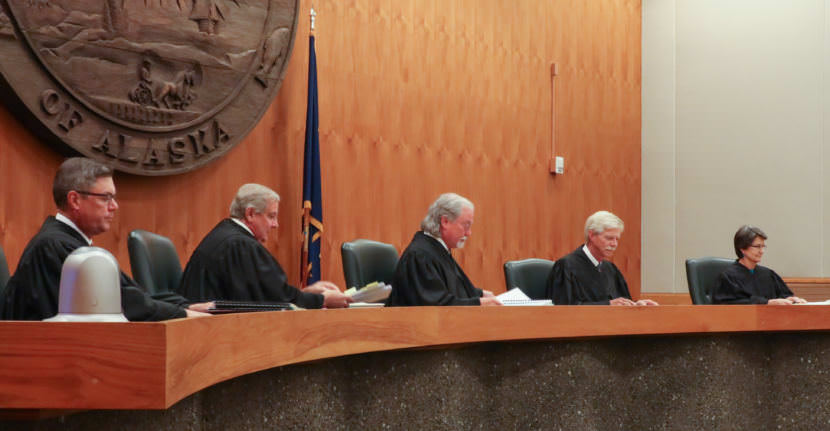
The fate of hundreds of millions in Alaska Permanent Fund dividend money now rests with the five Alaska Supreme court judges.
The court heard oral arguments Tuesday in Anchorage in a case seeking to overturn Gov. Bill Walker’s veto of $666 million in dividend funding last year.
Anchorage Democratic Sen. Bill Wielechowski and two former Republican state lawmakers sued last November to get the money back.
“It’s critical to Alaskans and I think we should share a little bit of our oil wealth with the people,” Wielechowski said.
Lower courts ruled last year the governor had the power to use his line item veto to take the money bound for dividend checks.
About 75 people watched as the justices heard from both sides today on the fifth floor of the Boney Courthouse in downtown Anchorage.
State attorney Kathryn Vogel argued that the money the governor vetoed was actually an appropriation and subject to his override.
But Wielechowski, a lawyer himself, disagreed, saying the original intent of the law that created the permanent fund dividend program was that the money is dedicated funding and not an appropriation therefore, not subject to veto.
He said the Legislature has that authority and not the governor.
“Both parties agree that the permanent fund dividend is a statutory entitlement,” Vogel said. “It is not in the constitutional amendment, and that enables the governor to, when faced with funding for that in an appropriations bill, to strike or reduce.”
“We think the Legislature did in fact dedicate the funding in 1980 and again in 1982 for dividends,” Wielechowski said. “When you have a dedicated fund, the governor can’t veto that. It’s not subject to the appropriation process. The only way that you change that is by a future Legislature changing that. Our position is, yeah, the Legislature can change that at any time. The Legislature’s hands aren’t tied. They just have to change the law.”
Before the hearing 35 people lined up outside the courthouse to protest the governor’s veto of the dividend money, and to let lawmakers know they don’t want to see their dividend checks reduced to pay for state government.
Permanent Fund Defenders group coordinator Juanita Casellius said the decision will likely have long lasting effects on the permanent fund dividend.
“This decision will open the door to raids on the permanent fund and the dividend if the governor is allowed to veto it,” Casellius said. “It’ll also protect the people’s money from raids if it is prevailing for Bill Wielechowski, (Rick) Halford and (Clem) Tillion.”
It can take up to a year for the Supreme Court to decide a case. Both sides don’t think it will take that long for a decision on this case.
Alaska Public Media’s Henry Leasia, Wesley Early and Sean Doogan contributed to this report.
